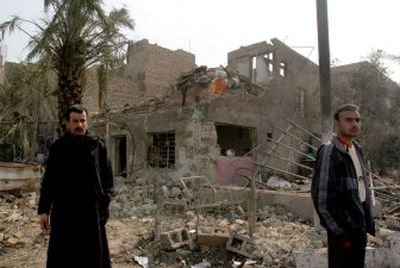Iraqi government urges security plan adherence

BAGHDAD, Iraq – The Iraqi government launched a plan Tuesday to secure a capital descending deeper into chaos, even as violence claimed the lives of more Iraqis, including people waiting in line for food handouts.
Lt. Gen. Abud Qanbar, the former naval officer appointed by Prime Minister Nouri al-Maliki to oversee the much-vaunted Baghdad security plan, announced a 72-hour closure of some border crossings along the Iranian and Syrian frontiers, restrictions on civil liberties and the suspension of weapons licenses except for those issued to authorized security officials and contractors.
“Legal procedures will be taken and strict penalties will be imposed against all those who violate the rules,” said Qanbar, reading from a statement broadcast over state television.
It was unclear from the presentation how some of the security provisions outlined differed from measures already in place. Observers also questioned why al-Maliki left the announcement to a surrogate. The prime minister spent much of the day visiting a university in Hillah, about 50 miles south of the capital.
The plan includes a tightening of the few remaining liberties left for Iraqis in the capital, including an earlier nighttime curfew and closer scrutiny of packages, mail and electronic communications. It imposes unspecified restrictions on gatherings in public places, clubs, companies and organizations “in order to protect citizens and those working in these places.”
Under the plan, Qanbar said his commanders will be authorized to interrogate and arrest all individuals and inspect private properties and seize any weapons, presumably without seeking the approval of courts or political leaders. It wasn’t clear whether the new provisions changed the existing rules, which allow each family to keep one weapon at home.
The plan calls for restrictions on the movements of vehicles and individuals as well as surprise sweeps of roadways, Qanbar said.
It includes a tightening of laws for those who commit acts of violence or harbor alleged terrorists and special court sessions to speedily try offenders.
The government plan also demands that those squatting in the homes of families who fled their neighborhoods out of fear of sectarian violence must vacate the properties within 15 days.
The announcement did not detail how the edict would be enforced but called for the establishment of “specialized committees” to audit property deeds.
The plan also bars vehicles with tinted windows or without license plates from traveling the city’s streets. Such vehicles have long been illegal but ubiquitous, often escorting the very political leaders now advocating the security plan.
U.S. and Iraqi officials hope their Baghdad security plan will stem the country’s slide deeper into sectarian civil war and lawlessness. The U.S. already has begun a move to buttress forces in the violence-torn capital, eventually adding 16,000 soldiers. Iraqis also have moved additional forces into the capital.
Still, more than three dozen Iraqis were killed or found dead in the capital alone Tuesday. At least 18 people were killed and 38 were injured in the suicide bombing targeting a crowd in a mostly Shiite neighborhood waiting in line for their monthly rations of flour, sugar and cooking oil. Another car bomb in eastern Baghdad killed four boys near a high school. Four other civilians were injured in the attack.